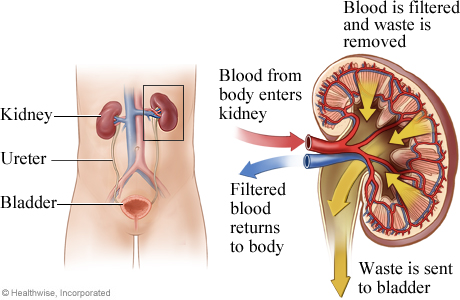How the Kidneys Work
Current as of: May 3, 2017
Author: Healthwise Staff
Medical Review: Anne C. Poinier, MD - Internal Medicine & Adam Husney, MD - Family Medicine & Tushar J. Vachharajani, MD, FASN, FACP - Nephrology

The kidneys are two bean-shaped organs located on either side of the spine, just below the ribs.
The kidneys filter wastes from the blood and help balance water, salt, and mineral levels in the blood. To do this, blood from the body enters the kidney. Inside the kidney, blood is filtered and waste is removed. Salt, water, and minerals are added if needed. The filtered blood is returned to the body and the waste from the blood is sent to the bladder as urine.
The kidneys also produce three important hormones: renin, erythropoietin, and the active form of vitamin D. Renin helps regulate blood pressure. Erythropoietin is needed to make red blood cells. Your body needs the active form of vitamin D to absorb calcium from food. Together, vitamin D and calcium help build healthy bones and maintain normal muscle function.
Blood flow to the kidneys is very important for the kidneys to work well. If blood flow to a kidney gets blocked, part or all of that kidney may die. This can lead to kidney failure.
Current as of: May 3, 2017
Author: Healthwise Staff
Medical Review: Anne C. Poinier, MD - Internal Medicine & Adam Husney, MD - Family Medicine & Tushar J. Vachharajani, MD, FASN, FACP - Nephrology
This information does not replace the advice of a doctor. Healthwise, Incorporated, disclaims any warranty or liability for your use of this information. Your use of this information means that you agree to the Terms of Use. Learn how we develop our content.
To learn more about Healthwise, visit Healthwise.org.
© 1995-2018 Healthwise, Incorporated. Healthwise, Healthwise for every health decision, and the Healthwise logo are trademarks of Healthwise, Incorporated.